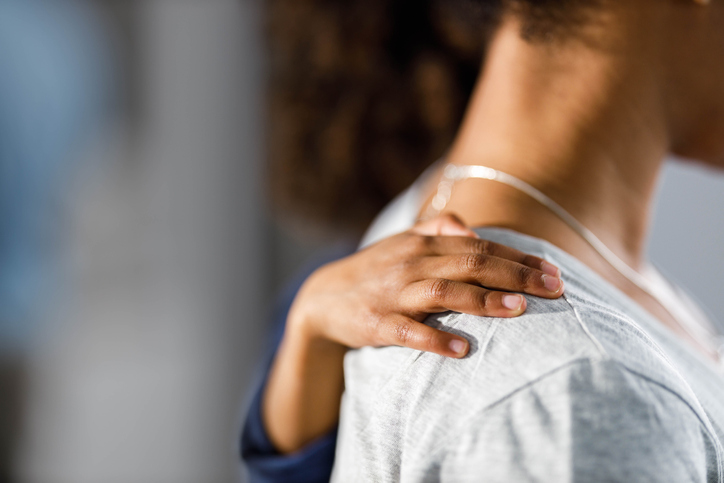
skynesher
I was raped at gunpoint in the woods near my father’s house—I was 17-years-old.
I staggered through the streets, miles from home, clothing torn, sobbing hysterically, until I stumbled on a phone booth to call my mother.
I spent hours showering in scalding water.
Like most Black victims, I refused to report my Black rapist to the police.
A week or so later, my mother looked at me and said, “You’re pregnant.”
A skipped period confirmed her diagnosis.
It was 1972 and abortions were illegal.
I never asked how my mother knew where to go but she took me to a smarmy white doctor in a dark building, where I laid on a table, where he scraped my insides and growled at me to stop squirming.
Hours later, I was doubled over in excruciating pain. My mother dragged me back to him to “fix it.” A cyst had ruptured on my ovary. He scraped some more and prescribed an antibiotic.
In the wealthy white high school that I integrated, I had seen the racial difference in how pregnancies were handled. The white girls “went away” for a long weekend – typically to Mexico or Canada – then returned to school, openly sharing their stories. I never heard any Black peer utter the word abortion, and my Black classmates had their babies.
The following year, the U.S. Supreme Court legalized abortion across the nation. They knew that denying women access to legal abortions didn’t stop them from terminating pregnancies but did increase the chances of them doing so under unsafe conditions.
A 1976 report on illegal abortions in the United States between 1972 and 1974 from Family Planning Perspectives Journal stated that, “the number of illegal procedures in the country plummeted from around 130,000 to 1,000 [and] the number of deaths associated with illegal abortion decreased from 39 to five. Women who died as a result of illegal abortions typically were Black, were more than 12 weeks pregnant, and had self-induced in their own community.”
After abortions became legal, I accompanied a number of sisterfriends to a place called Family Dynamics where they had their procedures in a safe, clean, medically responsible environment. I held them as they cried afterward, feeling each tear in my scarred womb.
While many women in this country are horrified at today’s Supreme Court decision to overturn Roe v. Wade after 49 years, Black and Brown women are experiencing an overwhelming mix of grief, rage and terror at the intersection of racism and sexism where we all reside.
Because we know.
Our bodies knew even before our minds were conscious, shaped by generations of racialized sexual trauma cascading through our DNA and ongoing trauma encoded in systemic inequities that attack us in various forms to the present day.
Not surprisingly, this country’s anti-abortion movement is rooted in white supremacy, exploiting Black women and the patriarchy keeping women’s bodies serving men. As the ACLU reports in “The Racist History of Abortion and Midwifery Bans, “Then, just as now, anti-abortion efforts have nothing to do with saving women’s lives or protecting the interests of children.”
The SCOTUS overturning Roe v Wade is ultimately about preserving whiteness. Among Census reports that low white birth rates will soon put them in the minority, attacking legal abortions is seen as essential to survival.
They know the dangers inherent in this new ruling. “Today a person is 14 times more likely to die by carrying a pregnancy to term than by having an abortion, and medical evidence has shown for decades that an abortion is as safe as a penicillin shot,” states the ACLU.
Where we live will make a difference.
Politico reports that abortion laws will vary by state. South Dakota, Kentucky, and Louisiana have laws immediately banning most abortions, and another 16 are projected to implement bans.
“The states most likely to ban abortion have greater proportions of People of Color … and about 60% of people obtaining abortions are People of Color,” according to NPR.
I’m side-eyeing the white women complaining about this recent ruling who’ve repeatedly proven that they’ll sacrifice most anything to uphold white supremacy. In 2016, some 47 percent of white women voted for Trump, and in 2020, some polls estimated that white women – 55 percent – voted for Trump, according to the Washington Post.
Meanwhile, white supremacy is willing, as usual, to sacrifice Black lives.
“Black women in the United States are three to four times more likely to experience a pregnancy-related death than white women,” according to the National Partnership for Women and Families report, “Black Women’s Maternal Health.”
Despite, income and education levels, Black women are more likely to experience preventable maternal death than with white women.
Both the health outcomes and economic impact of abortion bans will be profound. “We know that the single most cited reason Black give for abortion care is the inability to afford a child,” says the Black Women’s Health Imperative. With Roe overturned, “they and their children would likely be condemned to a lifetime of poverty and poor health outcomes.”
I have a daughter of childbearing age.
As I advised the women in my family this morning, “Let us mourn, grieve, and rage. And then, as always, call on our Ancestors, strategize the battle, and prepare to fight.”
Because that is what we were born to do.
RELATED CONTENT:
TaRessa Stovall is an author, blogger, journalist, survivor, and mother. She lives in Atlanta and blogs at Mixed Auntie Confidential.









